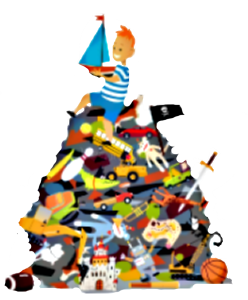Cornucopia Kids:
Children Who Have Too Much Stuff!
The term Cornucopia Kids was coined by psychologist Bruce A. Baldwin in the mid-eighties to refer to children who grow up in homes where the good life is available for the asking, and where no personal effort is required.
Fifteen years later the situation can only be described as even worse. Children in the year 2000 have an unprecedented amount of stuff combined with little or no responsibility for acquiring it, caring for it or replacing it.
The Danger Zone
Do you suspect your child may be in the danger zone? Here are some warning signs:
-Your preschooler has already been on a cruise or stayed at an expensive resort.
-Your middle school daughter regularly gets her nails done.
-There's never a quiet moment in your home because the television or stereo are always on, and a battle ensues if you try to turn them off.
-Your child has a Who Cares? attitude about the problems and needs of others because he's self centered and downright selfish.
-The new bike your son got for his birthday was left out in the rain the very first day. This is the samechild who routinely loses critical pieces to puzzles and games. He does these things because he's learned that what's lost or broken will be magically replaced.
-At a very early age your child began a collection of dolls, stuffed animals or action figures, and you feel it's your responsibility to support the collection by buying up every new one that comes out. You convince yourself that it's an investment.
-Your child always has unearned money to spend because you freely give advances on allowance, and her allowance is usually spent by mid-week.
-You personally do without new towels or a trip to the hairdresser to buy your child an outrageously prices pair of jeans, sneakers or prom dress.
Change Your Cornucopia Kid
Even as late as the teen years it's possible to reform a cornucopia kid. Here are some immediate steps parents can take:
-Give age-appropriate work responsibilities beginning in the preschool years. A 2-year-old can put his pajamas away and pick up his toys. A 4-year-old can help load the dishwasher.
-Don't give too many freebies. Getting too much for too little effort diminishes motivation. Create the link for your child between effort and reward. When your child demands something you can't afford, don't hesitate to say: We can't afford it!
-Limit TV time. Relying on external stimulation to entertain suppresses the imagination. Active learners are found on their bikes, on the playground or in the library, not glued to the television.
-Simplify birthdays and holidays. Limit the number of gifts your child receives. Put the emphasis on experiencing activities together such as a trip to a water park or planetarium.
-Teach your child to share with others. Help him go through his closet to choose outgrown clothes and no longer used toys to pass on to another child. A good practice is to let go of something old before something new is acquired, for example, just before something new is acquired, for example, just before Christmas or Hanukkah. With a strategy, some determination, and little bit of luck, you can corral your cornucopia kid!
How to Maximize Your Child's Learning Ability is a complete guide to choosing and using the best games, toys, activities, learning aids and tactics to maximize your child's learning ability. Here is a book that offers parents hundreds of practical things they can do in daily life to influence, encourage, and-best of all-maximize their child's learning ability.
About the Author
Dr. Lauren Bradway has a Master's Degree in Communication Disorders and a Ph.D. in Human Ecology. Dr. Bradway has specialized in working with children for over 20 years. In addition to running a successful clinical practice as a speech language pathologist, she is a consultant to pre-schools, elementary schools, and bilingual programs. She trains teachers to develop Individual Learning Style Profiles for classroom use.
Other Articles By Lauren Bradway






